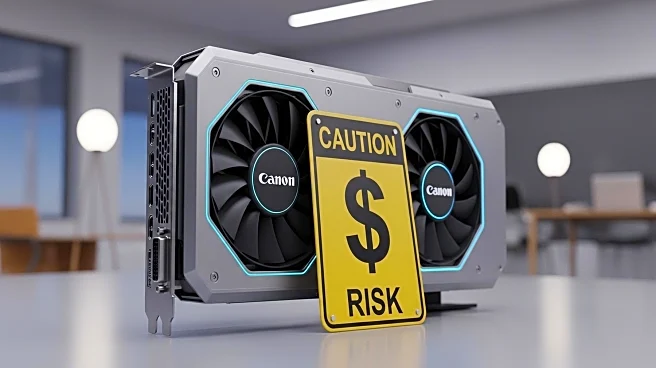What's Happening?
Nvidia's stock is facing turbulence after Citi cut its price target to $200, warning of a potential $12 billion sales hit from Broadcom. Analyst Atif Malik lowered his target from $210 to $200 while maintaining a Buy rating, citing growing pressure from rivals. Broadcom's recent strong results and new deals could shift demand away from Nvidia's GPUs, impacting Nvidia's future sales. Despite the challenges, Nvidia remains a leader in AI chips, with potential upside from its China business and broader AI spending trends supporting its growth story.
Why It's Important?
The warning from Citi highlights the competitive pressures Nvidia faces in the AI chip market, which could affect its market dominance and investor sentiment. The potential $12 billion sales impact underscores the significance of Broadcom's advances in the sector. However, the broader AI spending boom continues to offer support for Nvidia, with analysts maintaining a bullish outlook on its long-term prospects. This situation reflects the dynamic nature of the semiconductor industry, where companies must navigate competitive challenges while capitalizing on growth opportunities.
What's Next?
Nvidia's future growth will depend on its ability to adapt to competitive pressures and leverage opportunities in the AI market. The company may focus on expanding its presence in China and capitalizing on broader AI spending trends to offset potential sales losses. Investors will need to monitor Nvidia's strategic moves and market developments to assess its long-term growth potential. The ongoing competition with Broadcom and other rivals will likely drive innovation and strategic adjustments within the industry.
Beyond the Headlines
The competitive dynamics in the AI chip market highlight the importance of strategic positioning and innovation for companies like Nvidia and Broadcom. As the market evolves, companies will need to balance competitive pressures with growth opportunities, potentially leading to increased collaboration and partnerships. The situation also underscores the need for investors to diversify their portfolios and consider the broader market trends when making investment decisions.









